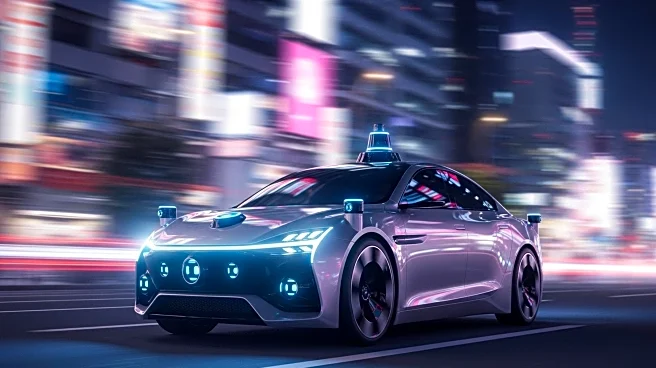What's Happening?
UK AI startup Wayve, in partnership with Nissan, is conducting real-world tests of its self-driving technology on Tokyo streets. This initiative marks a significant step in Wayve's global expansion strategy, which includes operations in the US, Germany, and Japan. The tests involve Nissan Ariya electric SUVs equipped with advanced sensor suites, including cameras, radars, and LiDAR, enabling Level 2 autonomous capabilities. Wayve's approach, termed 'Embodied AI,' utilizes machine learning models trained on extensive real-world data to adapt to urban environments. The collaboration aims to enhance Nissan's ProPILOT system, with a consumer launch expected in fiscal year 2027.
Why It's Important?
The collaboration between Wayve and Nissan represents a critical development in the autonomous vehicle industry, which is projected to reach $2 trillion by 2030. For Nissan, this partnership offers a potential revival amid declining sales and external pressures, including tariffs under President Trump. Wayve's technology could position Nissan to compete with major players like Honda, Toyota, and General Motors. The successful integration of Wayve's AI into Nissan's systems could lead to advancements in urban autonomous driving, offering solutions to traffic congestion and enhancing safety.
What's Next?
Wayve's testing in Tokyo is expected to continue, with plans to expand its AI Driver software integration into Nissan's advanced driver-assistance systems. The collaboration aims to gather more data from Japan's complex road networks to improve the adaptability of Wayve's technology across global markets. As the trials progress, regulatory approvals and public trust will be crucial for scaling to unsupervised Level 4 autonomy. The partnership could lead to broader adoption of autonomous vehicles in urban settings by 2027.
Beyond the Headlines
The partnership highlights the ethical and regulatory challenges in deploying autonomous vehicles, particularly in densely populated urban areas. Ensuring safety and gaining public trust are paramount, especially following high-profile incidents involving self-driving technology. Wayve's focus on cost-effective camera-and-radar setups may offer a competitive edge, but achieving full autonomy will require extensive data collection and validation.








